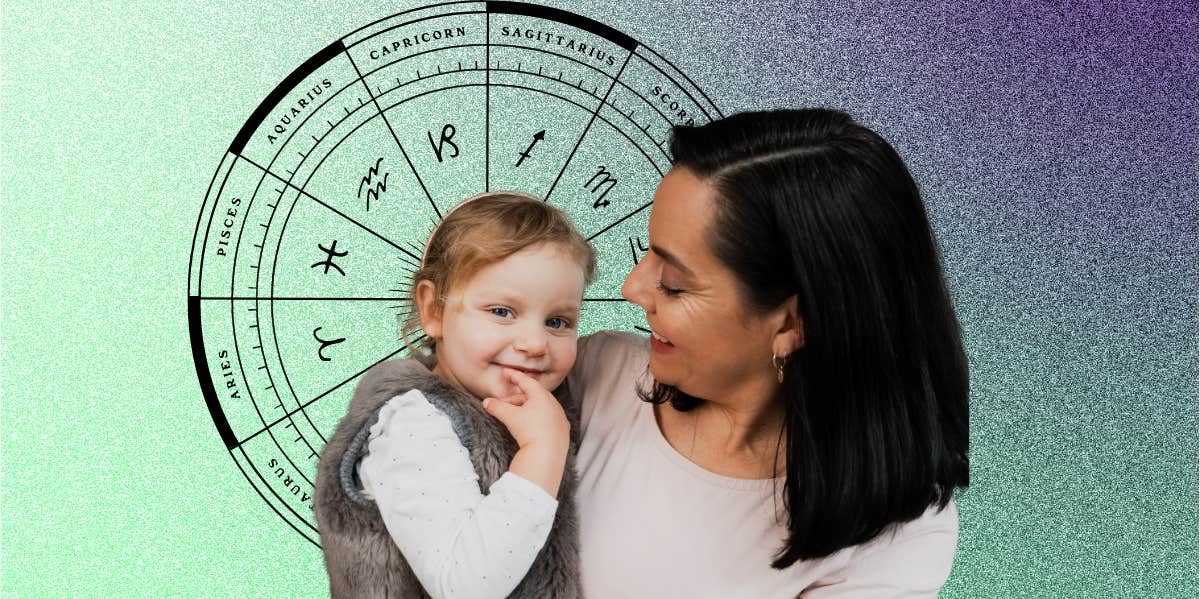How To Tell Which Traits Your Child Inherited From You, According To Astrology
The relationship between parent and child is fated, too.
 Cameron Stephen Prins via Shutterstock / Trendify and Blixa 6 Studios via Canva
Cameron Stephen Prins via Shutterstock / Trendify and Blixa 6 Studios via Canva When it comes to synastry, or comparing birth charts for compatibility, oftentimes the focus is on romantic relationships.
However, you can also compare the birth charts of parents and their children, which offers key insights into the traits and qualities they can inherit.
This specifically relates to how astrological aspects of a parent's planets interact with a child’s Ascendant or Rising sign.
The positioning of certain planets within the astrological houses of a child’s birth chart can give insight into what the relationship between parent and child is like as well as valuable lessons on how to effectively raise them.
For instance, with a Saturn Ascendant square in the child’s fourth house, an area that represents home and family, the child might feel under pressure to abide by the strict rules of the parent or end up growing up adopting people-pleasing behaviors to learn to cope.
Usually, it is just the romantic relationships within your life that are thought to be fated and divine, however, the relationship between parent and child is just as much so.
The parent-child synastry proves that ultimately your child’s soul did choose you as its parent and that your two life purposes are deeply intertwined.
When comparing the birth charts of you and your children, certain aspects can show the traits your children inherited from you as well as how they might surface.
Aspects that influence inherited traits in parent-child synastry
Trine
Trines between a parent and child represent the types of behaviors that they will pick up from you simply by spending time together.
These traits, though conditioned through example, are those that come to be a core part of who your child is.
Trines frequently are those positive interactions like being neat and keeping their rooms organized because they see you cleaning up the home frequently.
It represents traits so ingrained that it is likely neither you nor your child fully understands how similar you are.
Sextile
In many ways, a sextile in parent-child synastry represents a lesson of some sort that you intentionally teach your child that becomes a defined part of who they are and who they become. This is done through active teaching and encouragement such as academic or extra-curricular success.
It can also be in the teaching of the importance of giving to others that then is adopted into a way of life because the child sees value within it for themselves.
Square
A square represents a moment of crisis in astrology, something that is learned the hard and usually more challenging way.
In this case, a square holds meaning for where conflict and differences will arise between who you are and who your child is. You may try to teach, discipline, or control your child to change these parts of themselves but ultimately, it is an area of the synastry chart to bring greater understanding to.
For example, a square between Saturn and your child’s ninth or tenth house, which can govern learning, traveling, or work, can represent that you both have different viewpoints of success or the importance of education which can lead to disagreements over whether to go to college or not or even what to do after.
Opposite
As much as you may be similar to your child, you also are two separate individuals, which is what the Opposition depicts. In this synastry, you will unconsciously recognize things about yourself that you do not like or have not accepted within your child, yet may punish them for it.
It may be that you change your mind often which can frustrate you, yet when your child does it, you berate them for being flighty or too free.
This aspect allows you to understand more deeply where you need to love yourself so that you do not create conflict with your child for things that bother you about yourself.
Conjunct
The behaviors and traits that are inherited through Conjunctions in astrology are those that you have genetically passed down to your child.
These might be similar physical features like face shape or eye color, but can also be attributes like having a high aptitude for science or a love of travel.
Conjunctions are so ingrained in who your child is that even if they do not spend time with the biological parent, they still end up mirroring these qualities.
Quincunx
Many times, as a parent you will condition your child through guilt, shame, or unintentionally creating unnecessary difficulties for them. A Quincunx represents the traits that your child will inherit from you through discouragement or ridicule.
This could show up as a child being more introverted, yet the parent guilts and shames them into being more social so that they then end up not being true to themselves and which creates distance and separation within the parent-child relationship.
Quintile
This is one of the most beautiful aspects in parent-child synastry as it represents the qualities that you refine and shape within your child through love and encouragement.
It often is a talent or predisposition that the parent has not acknowledged within their own self that they then unconsciously support and help their child achieve. In this case, for example, the parent may have been wonderful writers but doubted their own skills and so they end up helping their child become a writer for the school newspaper or major in journalism.
Kate Rose is an artist, writer, spiritual astrologist, relationship and life coach, and motivational speaker. For more of her work, visit her visit her website.
